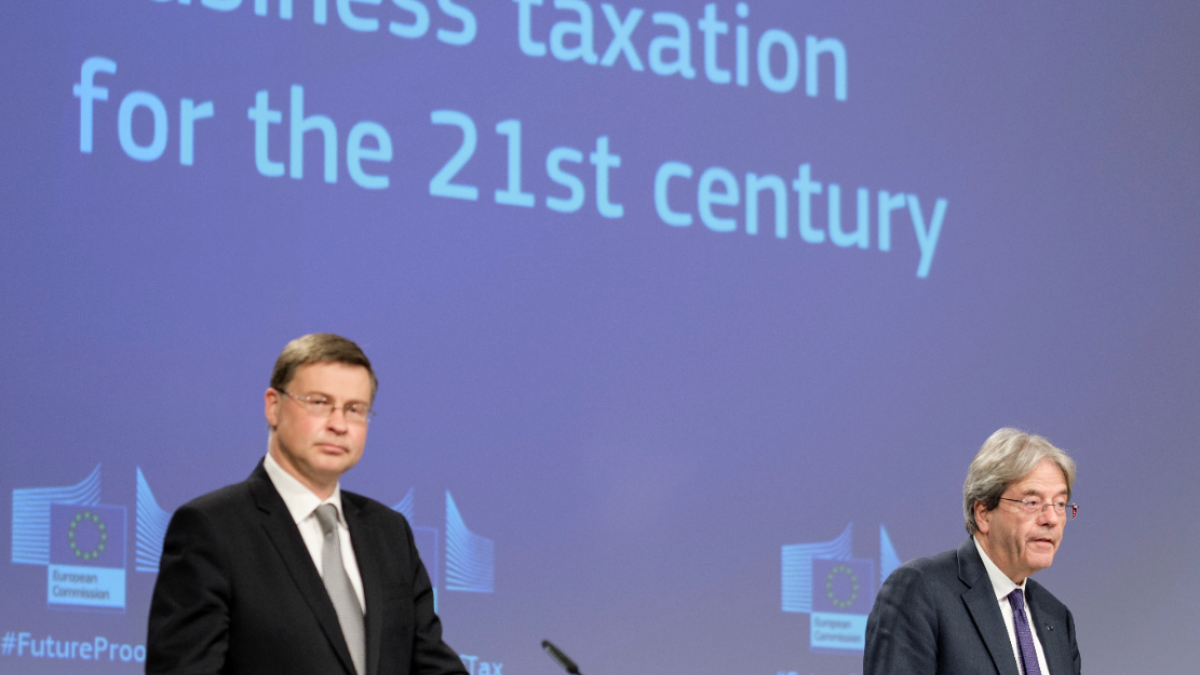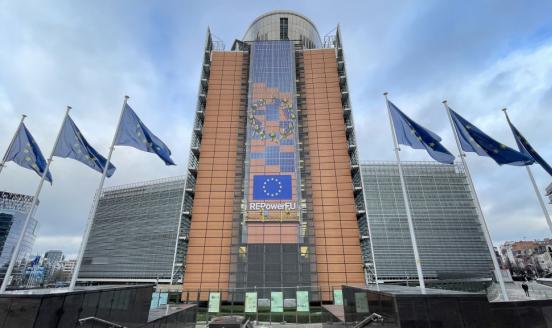International tax debate moves from digital focus to global minimum
International corporate tax reform is coming closer if countries can set aside their differences and work for progress rather than the perfect deal.

The Organisation for Economic Cooperation and Development is continuing its fight against profit-shifting by focusing on the digital economy. In making a specific link to the digital transition, the OECD hoped to build a global consensus that companies earning profits in countries where they don't have a physical presence have an obligation to pay taxes somewhere on those profits. The 2015 Base Erosion and Profit Shifting (BEPS) project made great strides in improving international exchange of tax information and in curbing practices identified as particularly harmful. The next goal was to create an "inclusive format" that invited far more countries to the negotiating table, and to find a deal by mid-2021 on how to tackle profit-shifting more directly by examining sectors that rely heavily on intangible assets.
New momentum in the OECD process offers a real chance of a deal before year-end. Progress will require countries to widen their focus, however, and perhaps let go of the hope for cross-border windfalls from Google, Amazon, Apple, Facebook and Microsoft. Prior proposals for an EU-wide digital services tax were politically anchored around the sense that these companies weren't paying their fair share or compensating the countries from which they drew their customers. Now the emphasis is shifting to the world's biggest and most profitable companies, rather than its largest digital platforms. This offers a rare opportunity to expand the global corporate tax base.
Success will require a shift in political thinking, particularly in Europe. EU corporate income tax rates have been in steady decline, even if tax revenues have held up, and political pressure has zeroed in on the American tech giants. As a whole, the EU's tax strategy has been fragmented and nationally driven. An OECD agreement would offer a reset and revive the prospect of a more coordinated single market.
Finding global consensus among 139 participants is no easy task, especially when the negotiators include emerging markets and other countries that have historically steered clear of tax talks. The OECD's blueprint called for a two-pronged strategy. Pillar One would tackle the way companies show taxable presence in a country, looking specifically at automated digital services and consumer-facing businesses. The idea is to take account of profits generated – for example from advertising, streaming services or online sales – in countries where a firm does not have a physical presence. Pillar Two aims to establish a global minimum corporate income tax rate. Its specifics include an income inclusion rule, to make sure companies pay taxes on the profits from all of their subsidiaries around the world, and also undertaxed payments and ‘subject to tax’ rules to make sure that parent companies are not evading tax authorities either.
In Europe, Ireland and some other countries that have long opposed harmonised tax rates were sceptical of a minimum tax rate, while France and others have zeroed in on the prospect of scraping more revenue from big tech. Europe has had some success agreeing on information-sharing and anti-abuse measures in recent years. But on trickier questions of corporate taxation, little has budged.
Pillar One has been of particular interest to countries that already established digital services taxes, which have in some cases pledged to eliminate their national measures once a global accord is in place. EU leaders saw a chance to blaze their own trail if the OECD talks remain stalled and have said the Next Generation EU pandemic recovery plan should be partially paid for by a digital levy. Meanwhile Pillar Two has dominated the global debate, in keeping with its potential to deliver most of the new tax revenues.
The US strategy has been a particular puzzle, both because it is home to most of the world's tech giants and because its political leadership has been so volatile. The Trump administration won plaudits for its introduction of a global intangible low-taxed income (GILTI) tax that put a minimum 10.5% rate on US multinationals. On the other hand, the GILTI system was full of loopholes and was accompanied by massive corporate tax cuts that failed to translate into gains for the overall economy. Any growth in corporate investment was because of a general rebound in demand rather than impetus from the tax cuts, according to a 2019 International Monetary Fund working paper. The Trump team further heightened tensions by starting trade investigations against countries including France, Italy and the UK that implemented or planned digital services taxes, and pushed a ‘safe harbour’ proposal that would allow tech companies to opt out of any international tax conventions.
Now the U.S. has done a total about-face. The Biden administration has abandoned the Trump safe harbour, has delayed or ended many of the tax trade investigations, and has rejoined the OECD talks with a bang. The US has proposed a revamped Pillar One approach that narrows the focus to the world's most profitable companies, expected to number about 100, instead of trying to tackle thousands of firms across hundreds of jurisdictions. It further seeks to set the OECD minimum tax level at 15%, alongside its domestic proposal to require higher rates from US companies. At home, the US wants to go further to make sure companies meet their tax obligations under the Stopping Harmful Inversions and Ending Low-tax Developments (SHIELD) proposal, which would require companies to pay the difference between their international tax bills and US minimum levels on a country-by-country basis. This is internationally interesting because it makes it harder for big firms to avoid taxes. From a domestic political standpoint, it also sets up a handy exchange of jargon: where "safe harbour" was set up to protect the companies, SHIELD will protect taxpayer revenues. Technically the two concepts have absolutely nothing to do with each other. In Congressional debates, the parallelism may pay dividends.
Where does this leave Europe? Regrouping, if not entirely disgruntled. At the central level, the European Union has been very supportive. The EU digital levy, which the European Commission will propose on 14 July, has been rhetorically reformatted. As recently as January, Commission officials were still supporting expectations that the tax would follow in the footsteps of the failed digital services tax proposal. But in April, after the US stepped into the debate, the Commission signalled it planned to take a ‘soft’ approach that does not interfere with the OECD process. While the Commission still needs a proposal in line with what the leaders promised last year, it may make the design so broad as to effectively tap into sales revenues rather than targeting platform customer bases or other more novel approaches.
Among EU countries, opinions are mixed. Estonia, the Czech Republic and Poland have been pushing back against Pillar Two for some time. Countries with specific tax breaks, like France's research and development incentive, will insist that any global deal should maintain those investment measures as official carve-outs. Ireland has shifted its stance from against a global minimum to protecting a level of 12.5% as a red line. It also has suggested that the OECD's two pillars need to move together for any deal to be possible, a stance echoed by the UK and other countries that have put a political focus on the digital. These defenders of Pillar One will be particularly concerned that they may lose out on digital tax streams because the total package emphasises parent company profits and not business-line income. These considerations do not make a deal impossible, but they do increase the number of moving parts. In addition, Europe will need to be mindful of the need to adopt EU directives for any global accord, in order to make sure the standards line up with Treaty obligations and EU Court of Justice oversight. As always, EU tax decisions must be taken unanimously. An OECD deal would presumably come with support from most of the bloc, but Cyprus is not taking part in the global talks, and any negotiation raises the possibility of political rifts.
How much money is really at stake? The topline figures suggest not that much. The OECD's combined estimate, released in October 2020, suggested that the total global effort could raise up to $100 billion, or roughly €82 billion at end-May 2021 rates (although it could turn out to be more if a higher rate is agreed). On closer examination, even that number – about 4% of global corporate income tax revenues, and considerably smaller than the total market capitalisation of any one of the world's top 100 companies – is less impressive than it looks. Further, about $20 billion of that is attributed to the US GILTI rules already in place. This leaves a potential increase of $50 billion to $80 billion, which the OECD says mostly would come from Pillar Two. Pillar One, the part aimed most squarely at digital industries, would mostly involve moving money around, not increasing the total tax pool.
The two pillars could, at least in theory, be de-linked. From an implementation perspective, Pillar Two would be implemented by each country setting their minimum tax rate at or above the OECD minimum, requiring companies to report their earnings in each country, and assessing top-up taxes to cover the difference between taxes paid and the minimum rate. This measure would cover all sectors and work with existing accounting practices, taking advantage of additional reporting to zero in on the country-by-country figures.
Pillar One only works if all of the participating countries adopt new measures collectively, in relative unison. It includes an aspect of formulary apportionment – which is to say, redistribution – that has long been contentious, as the European Commission found in its failed Common Consolidated Corporate Tax Base proposal, retooled in May as the Business in Europe: Framework for Income Taxation (BEFIT) plan. Such redistribution means not every country will come out ahead. The US-backed version of Pillar One would be simpler to implement than its predecessor and would raise about the same amount of money, but it might not capture the same range of technology firms. Notably it could leave out Amazon. In contrast, Pillar Two sets a floor and also provides for a top-up mechanism. This means each participating country would enforce the minimum tax level on its own companies, and would have the opportunity to set a higher rate if its domestic situation allowed.
The EU needs the OECD to get a deal if its own corporate tax plan is to advance. The European Commission has said the details of BEFIT will be heavily based on the outcome of the global talks. If the OECD stalls, it is hard to see how BEFIT moves forward.
Transatlantic trade dynamics have the potential to both enhance and hinder the OECD process. On the one hand, the world benefits greatly if US participation is assured, and the Biden administration may have a greater chance of getting a deal through Congress if the US can brag about first-mover rights. On the other hand, Biden's team has not dropped all of the Trump-era trade investigations, even if it has postponed any talk of sanctions, and Treasury Secretary Janet Yellen has been clear about the administration's opposition to any tax that specifically targets American technology firms. This is likely to frustrate European policymakers, who want to rein in the American giants. It also reflects the internal conflict in the European sentiment – the EU would like to develop its own technology centres as a way to make the bloc internally self sufficient, but it also has been reluctant to make its capital markets and investment frameworks accessible at the same levels available to the US companies it is frustrated at being unable to control.
The OECD momentum is a welcome turn of events that should not be sacrificed at the altar of the ideal outcome. The 15% minimum tax rate is already lower than some advocates had hoped, and would be a big step forward. Even a 12.5% rate would be an improvement over the fragmented status quo – a year ago, such a figure would have been above the US stance and would have represented a real breakthrough – so it is not surprising Ireland and its allies are digging in on trying to preserve it. Likewise, it might be best if all the big tech companies fell under the umbrella of an initiative aimed at taxing the digital economy fairly, but any kind of international deal would still be a step forward. The big companies themselves seem to recognise this, calling for clarity and tax certainty rather than opposing the effort. A ‘deal beats no deal’ mentality may further be required of developing countries, who prefer higher rates that would shift more money their way.
The tax talks are a clear case of how joint action, even on a modest scale, can be more powerful than a hodgepodge of efforts to crack down on – or attract – companies who want to avoid high tax bills and have the time and resources to figure out how. If the OECD talks succeed, the whole world takes a big step forward.
Recommended citation:
Christie, R. (2021) ‘International tax debate moves from digital focus to global minimum,’ Bruegel Blog, 27 May



